Background: Postage stamps are more than a convenient way of paying for postage. The National Socialists put out many stamps with propaganda intent. What follows is a small collection. The scans for the bottom ten stamps were sent to me by Helly Alberto Angel González of Venezuela. They are scanned at larger than actual size, which makes viewing easier.
Nazi Postage Stamps
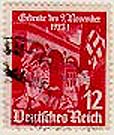 |
This stamp commemorates the 1923 Beer Hall Putsch in Munich, Hitler's abortive attempt to seize power by force. Later, the Nazis claimed that the Putsch had been necessary to demonstrate the revolutionary nature of Nazism. In 1933, 9 November became a national holiday, complete with a re-enactment of the original march in Munich. |
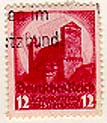 |
This stamp commemorates the 1934 Nuremberg Party Rally. |
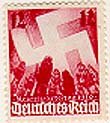 |
A stamp for the 1936 Nuremberg Rally. |
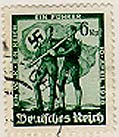 |
The translation: “One people, One Nation, One Führer.” This stamp commemorates the election Hitler called for 10 April 1938 to celebrate the incorporation of Austria into Germany. |
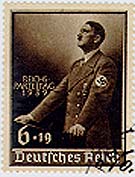 |
This rather interesting stamp was produced for the 1939 Nuremberg Party Rally, which was to go by the name “Party Rally of Peace.” However, World War II began shortly before the rally was scheduled to begin, and it was cancelled. |
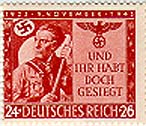 |
This stamp from 1943 commemorates the 20th anniversay of the Beer Hall Putsch. The war situation was looking grim, and the Nazis increasingly claimed that since they had overcome great obstacles as a movement before taking power, they should be able to overcome even greater obstacles. The text translates as “And you have won after all,” a statement from one of Hitler’s speeches suggesting that the dead had found their vindication in the Nazi takeover. |
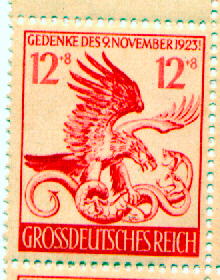 |
This stamp commemorates the 1923 Beer Hall Putsch in Munich. |
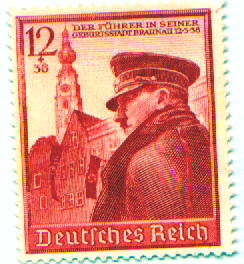 |
This 1938 stamp includes the text: “The Führer in the city in which he was born: Braunau am Inn.” |
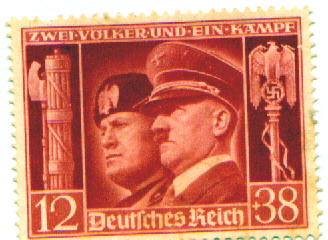 |
The caption to this stamp is “Two peoples—One battle.” It is an interesting take off on the common poster of Hitler during the war years that carried the caption “One People, One Nation, One Leader.” |
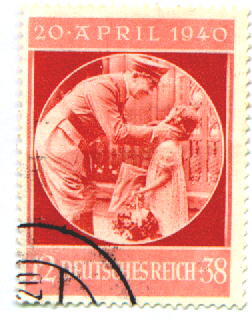 |
This stamp is the 1940 commemoration of Hitler’s birthday. |
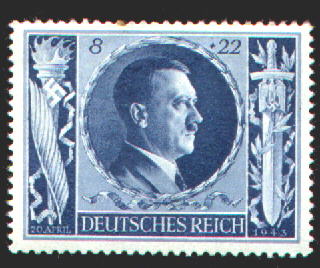 |
The stamp for Hitler’s Birthday in 1943. |
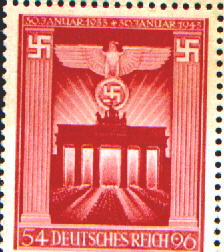 |
A stamp commemorating the 10th anniversary of the Nazi seizure of power in 1943. |
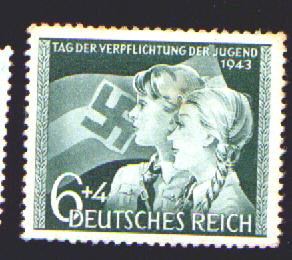 |
“Duty of Youth Day,” 1943. This holiday was something of a rite of passage, on which new members were often admitted to the Nazi Party. |
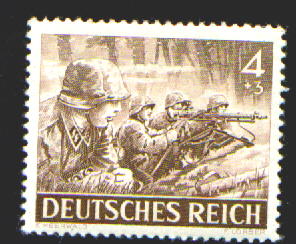 |
One of a series of 12 stamps with war scenes from 1944. |
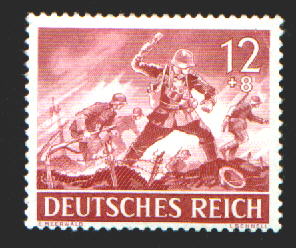 |
A second stamp in the same series. |
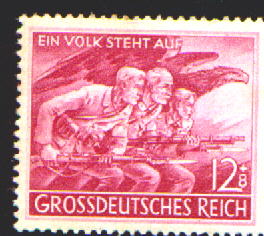 |
February 1945 “A people rises up.” James Biedzynski tells me this was issued to promote the Volkssturm, Nazism’s last effort to mobilize both the young and the old to defend the Reich. |